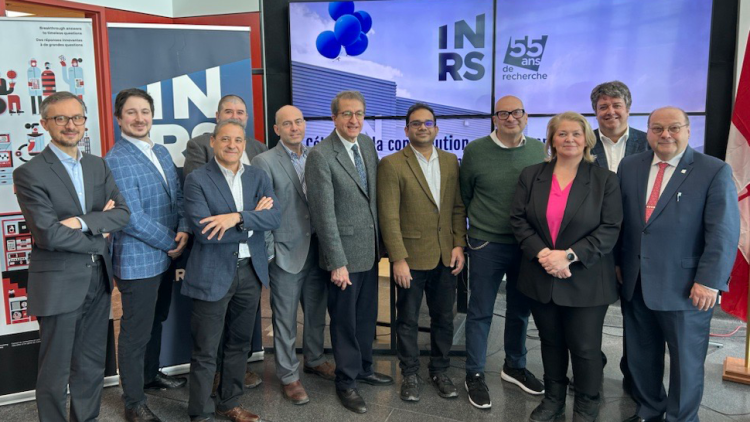A total of eight teams at Institut national de la recherche scientifique (INRS) working in the field of quantum research have just received funding for a total of $8.2 million from the Government of Canada. This is significant news for 2025, which has been declared by the United Nations as the International Year of Quantum Science and Technology.

Left to right : Luca Razzari (professor), Fabio Boschini (professor), José Azaña (professor), Emanuele Orgiu (professor), Patrizio Antici (professor), Alejandro Adem (president of NSERC), Sharif Sadaf (professor), Roberto Morandotti (professor), Sherry Romanado (Parliamentary Secretary to the President of the King's Privy Council for Canada and Minister of Emergency Preparedness), François Legaré (Director of INRS Centre Energie Matériaux Télécommunications Research Centre) et Luc-Alain Giraldeau (INRS Chief Executive Officer).
The announcement was made on January 21 at the INRS Centre Energie Matériaux Télécommunications Research Centre in Varennes by Sherry Romanado, Parliamentary Secretary to the President of the King's Privy Council for Canada and Minister of Emergency Preparedness, on behalf of the Honourable François-Philippe Champagne, Minister of Innovation, Science and Industry. The MP for Longueuil-Charles-LeMoyne was accompanied by the President of the Natural Sciences and Engineering Research Council of Canada (NSERC), Alejandro Adem.
« This major funding that the Government of Canada has awarded to our teams is a testament to the quality of the research that we are doing and the infrastructure that we are using to develop quantum technologies. The investment strengthens our leadership position in a field that is highly strategic for Québec and Canada and will let us continue to advance the frontiers of science and innovation in the service of society. »
Luc-Alain Giraldeau, Chief Executive Officer, INRS
As part of the National Quantum Strategy, NSERC's Alliance grants strengthen and support quantum research in Canada by funding partnerships between universities and public and private organizations.
« One of the areas of expertise for which the Centre Énergie Matériaux Télécommunications is renowned is the future of quantum communication systems. We have some of the world's leading experts in this field, including Professor Roberto Morandotti, who have access to high-calibre facilities. »
François Légaré, Director of INRS Centre Energie Matériaux Télécommunications Research Centre
Improving cybersecurity and biomedicine
Professor Roberto Morandotti, nonlinear optics specialist at INRS and holder of the Canada Research Chair in Smart Photonics is spearheading a research consortium entitled "Advanced QUAntum applications via complex states in integrated and meta optics (AQUA)", which received close to $5 million over five years (Alliance Consortia Quantum grants). The concrete aims of the AQUA project are intended to position Canada as a leading source of ultra-secure information systems and biomedical instruments with improved diagnostic capabilities.
Co-directed by INRS professors Sharif Sadaf, José Azaña, Luca Razzari and Bienvenu Ndagano, this major project pools the expertise of McGill University, the University of Toronto, the University of Alberta, Université de Sherbrooke, and Swinburne University of Technology, in addition to the following industrial partners: CMC Microsystems, COMBS, Enablence, few-cycle Inc., Ki3 Photonics Technologies, OptoElectronic Components, Pasqal, SpectraCann, and Xanadu Quantum Technologies.
The Internet of the future will be quantum
Professor Sharif Sadaf, nanophotonics specialist and holder of the Canada Research Chair in III-nitride Compound Semiconductor Nanostructures and Devices is leading the "Scalable solid-state semiconductor platform for on-chip quantum communication" project (Alliance Quantum grant, $1,170,000 over four years).
The team, which includes collaborators from McGill University and Polytechnique Montréal, as well as industrial partners Xanadu, CMC Microsystems, OptoElectronic Components and Numana, aims to develop a cutting-edge semiconductor platform for generating and manipulating quantum photon states. This will enable the creation of future technologies for electronics and optoelectronics, including computer hardware, and the development of next-generation on-chip quantum communication linked to the Internet of the future.
Professors Roberto Morandotti and José Azaña are collaborating on the "High-dimensional photonic systems for quantum information processing" project to demonstrate the feasibility of the quantum Internet (Alliance Quantum grant, $1,275,000 for 4 years). The team aims to develop and commercialize a scalable photonic quantum processor based on complex photonic states. They also want to implement high-dimensional quantum computation operations and algorithms and build a testbed for secure quantum communication in fiber-optic links.
« This will help establish an outstanding, versatile workforce that will position INRS, Québec, and Canada at the forefront of world leaders for advances in these fields, which are incredibly strategic for the future. We are very enthusiastic about working on these promising projects. »
Roberto Morandotti, INRS professor specialist in nonlinear optics at INRS
The group's work, supported by a complementary grant from PRIMA Québec, also involves industrial partners Ki3 Photonics Technologies and OptoElectronic Components.
New international collaborations and promising initiatives
Le professeur Morandotti et sa collaboratrice Sara Ducci (Université Paris Cité) avec le projet « Canada-France QUANTUM: Enabling QUantum Information Processing through complex Photon States (EQUIPPS) » (subvention CRSNG-Agence nationale de la recherche (ANR) de France dans le domaine des technologies quantiques) Professor Morandotti and his collaborator Sara Ducci (Université Paris-Cité) with the "Canada-France QUANTUM: Enabling QUantum Information Processing through complex Photon States (EQUIPPS) project" (NSERC-French Agence nationale de la recherche (ANR) on quantum technologies Grant, $300,000 over three years).
Professor Ndagano and his collaborator Hugo Defienne (Institut des NanoSciences de Paris, Sorbonne Université) with the "Canada-France QUANTUM: Phase-sensitive Hong-Ou-Mandel Microscopy" project (NSERC-French Agence nationale de la recherche (ANR) on quantum technologies Grant, $300,000 over three years).
Professor Fabio Boschini with the "Control of Kondo coherent states using selective optical excitation project (Alliance International Catalyst Quantum grants, $25,000 over 1 year). Professor Boschini is also holder of the Canada Research Chair in Quantum Materials' Dynamics.
Professor Emanuele Orgiu with the "Hybrid Molecule/Quantum Material van der Waals heterostructures" project (Alliance International Catalyst Quantum grants, $25,000 over 1 year).
Professor Sadaf, with the "Deterministic and scalable InGaN/GaN quantum emitters at room temperature" project (Alliance International Catalyst Quantum grants, $25,000 over 1 year).
Congratulations!










